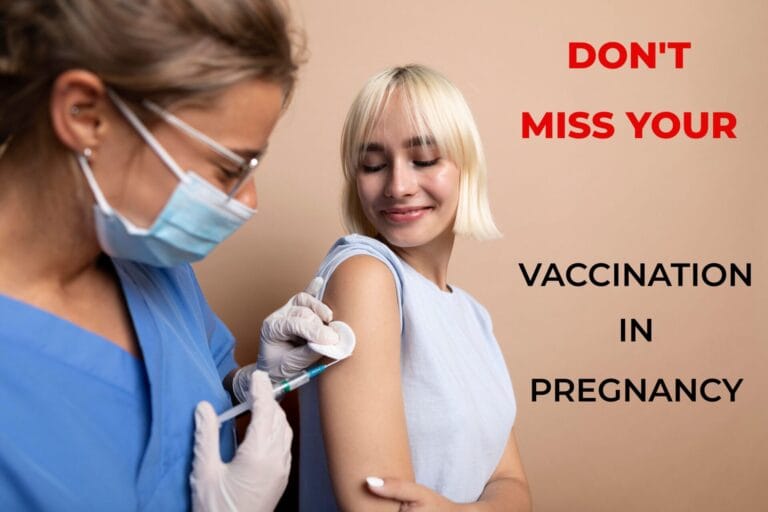Why do I need vaccination in Pregnancy?
Vaccinations are preparations of killed or weakened, microorganisms that help your immune system to build resistance to infections, without you really getting infected. They are administered as injections, oral suspensions or intranasal sprays and give us acquired immunity against many deadly diseases.
There are many vaccine preventable diseases which increase maternal morbidity and mortality and also lead to adverse pregnancy outcomes like preterm delivery, spontaneous abortion and intrauterine growth retardation. Vaccination against these diseases reduces the risk to mother, prevents many pregnancy related complications to the baby and also provides passive immunity to the baby against many diseases. That is why you must get your vaccination in pregnancy.
Table of Contents
What are the types of vaccines available?
There are six main categories of vaccines:
- Inactivated vaccines: are those vaccines which contain inactivated or dead microorganisms. These pathogens, being dead, are unable to cause disease but their presence stimulates the immune system to produce antibodies against them, giving us immunity. For example rabies, polio (Salk vaccine), influenza vaccines are all inactivated vaccines.
- Live attenuated vaccines: are those vaccines which contain live but weakened microorganisms. These stimulate our immune system to provide immunity but are not powerful enough to cause infection. For example, measles, mumps, rubella, tuberculosis, chickenpox, polio (Sabin vaccine) are all live attenuated vaccines.
- Toxoid vaccines: are those vaccines which only contain inactivated toxins from pathogens and not the pathogens themselves. For example tetanus toxoid.
- Subunit vaccines: are those vaccines which contain a part or subunit of an organism and not the complete organism. For example acellular pertussis vaccine, pneumococcal vaccine, influenza vaccine, hepatitis B vaccine.
- Viral vector vaccines: are those vaccines which deliver the genetic information of a pathogen through a harmless virus, stimulating the immune system to develop immunity against that pathogen. For example Covid-19 vaccine by AstraZeneca.
- mRNA vaccines: This is a newer technique which helps in producing large number of vaccines in a comparatively shorter period of time.
Which vaccines are given in pregnancy?
There are so many vaccines available but all vaccines cannot be given in pregnancy as many of them are not safe during this period. In general, inactivated and toxoid vaccines are preferred and live attenuated vaccines are never given in pregnancy.
Some vaccines are mandatory in pregnancy and some are optional. You should always get your mandatory vaccination done and discuss the optional vaccinations with your health care practitioner.
The vaccination schedule in pregnancy may vary according to geographical location, patient factors and doctor’s preference. Following is the vaccination schedule which is routinely practiced in our setup:
- Tetanus toxoid injection: Tetanus caused by a soil borne bacteria called as Clostridium Tetani. If contracted, it causes severe muscle spasms of all the body and a condition called as Lock Jaw, in which the face is spasmed into a grimace. It can be prevented by Tetanus Toxoid vaccination which is administered as three shots – first at the completion of first trimester, second after 4 to 6 weeks of first shot and third shot of the vaccine as part of injection Tdap at 27-36 weeks of pregnancy. This vaccine protects mother and the newborn from tetanus which is an important cause for infant death and maternal death due to unsanitary conditions at the time of childbirth.
- Influenza vaccine or Flu Shot: Pregnancy is a state of lowered immunity and you are more likely to suffer from flu or it’s complications like pneumonia than nonpregnant women. Maternal flu is also associated with adverse pregnancy outcomes for baby like preterm delivery, stillbirth, low birth weight baby, abortion etc. So you must get your influenza vaccination in your pregnancy. This vaccine can be given during any trimester of pregnancy but the ideal time is the end of October every year. The advantage of taking an influenza vaccine is that it not only protects you from influenza in pregnancy but also protects the baby for several months after birth, against flu and flu related hospitalizations. The vaccine has an excellent safety record.
- Tdap vaccine: You must get a Tdap vaccine during your pregnancy and this vaccine has to be be repeated in each pregnancy. It is given during the late second to third trimester of pregnancy (27-36 weeks gestation). This vaccine has three components – tetanus toxoid, reduced diphtheria toxoid and acellular pertussis vaccine. Getting your Tdap vaccine in pregnancy offers passive immunity to your baby against pertussis during the first few months of life till he gets his own DPT vaccination at 6 weeks of age. The vaccine also contains immunization against tetanus and diphtheria. (This vaccine is similar to DPT vaccine the child receives after 6 weeks of birth. If the mother is vaccinated in the last trimester during her pregnancy, then even the newborn baby has immunity against these deadly infections till it receives DPT at 6 weeks after birth).
- Hepatitis B vaccine: If not already vaccinated, then all pregnant women must be vaccinated with hepatitis B injection during pregnancy. Hepatitis B is a vaccine preventable viral infection which can cause damage to the liver and even its cancer. Three shots are required for the vaccination which are given at monthly intervals. A booster needs to be taken after 5 years.
Mentioned above are the routine vaccines in pregnancy but many optional vaccines like COVID-19 vaccine can be given according to your need and suggestion by your healthcare practitioner.
Any precautions for my pregnancy vaccination?
If you are planning your pregnancy, there are certain things that you should keep in mind while visiting your health care practitioner:
- Inform your doctor about any previous vaccine allergy that you had in the past.
- Inform your doctor any any severe allergy to any medicine or object in the past.
- If not yet pregnant, complete all your routine pending vaccinations before you plan your pregnancy.
- Always carry your vaccination record when you visit your doctor in your pregnancy.
Carry home message
Vaccination is an extremely important part of your pregnancy care. Before planning your pregnancy, you should get all your pending vaccinations completed. When pregnant, contact your healthcare provider early, provide information of all your vaccinations taken earlier and any history of allergic reactions to any vaccine in the past. You should also mention history of any other severe allergy to any medication or any other object in the past. Your healthcare provider will make a vaccination plan for you by including the mandatory vaccines and discussing the optional vaccines with you.
Get your vaccines in your pregnancy and have a safe and healthy pregnancy!

For more such interesting information on women's health, kindly visit our website Expert Gynae Care and our YouTube channel @drnidhigarg
To consult Dr. Nidhi Garg, please visit us at Kamal Hospital, Doaba Chowk, Jalandhar-144004 or Visit our website kamal Hospital jalandhar or Expert Gynae Care



2 thoughts on “Vaccination in Pregnancy”
Comments are closed.